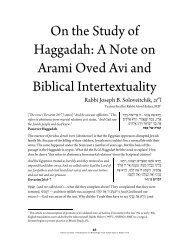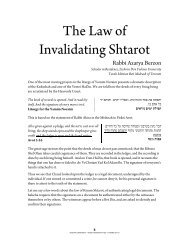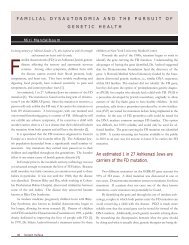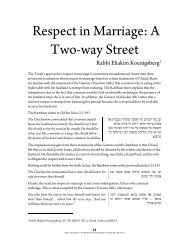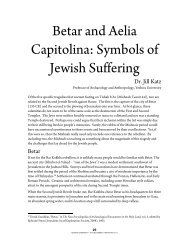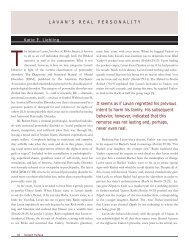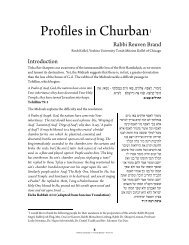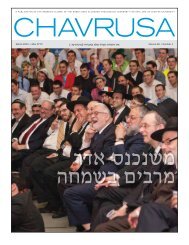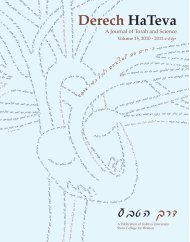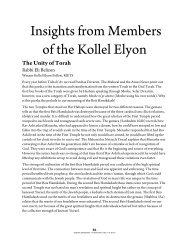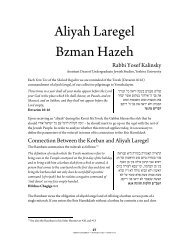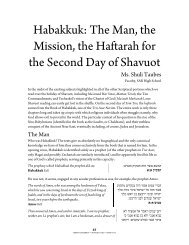YESHIVA UNIVERSITY • SUKKOT TO-GO ... - YU Torah Online
YESHIVA UNIVERSITY • SUKKOT TO-GO ... - YU Torah Online
YESHIVA UNIVERSITY • SUKKOT TO-GO ... - YU Torah Online
You also want an ePaper? Increase the reach of your titles
YUMPU automatically turns print PDFs into web optimized ePapers that Google loves.
Neither is it beyond the sea, that you should say: 'Who shall go<br />
over the sea for us, and bring it unto us, and make us to hear it,<br />
that we may do it?' 14 But the word is very close to you, in your<br />
mouth, and in your heart, that you may do it.<br />
Devarim 30:11-14<br />
34<br />
<strong>YESHIVA</strong> <strong>UNIVERSITY</strong> <strong>•</strong> <strong>SUKKOT</strong> <strong>TO</strong>-<strong>GO</strong> <strong>•</strong> TISHREI 5771<br />
אוה םיל רבעמ אלו ( גי)<br />
: הנשענו התא<br />
החקיו םיה רבע לא ונל רבעי ימ רמאל<br />
יכ ( די)<br />
: הנשענו התא ונעמשיו ונל<br />
ךבבלבו ךיפב דאמ רבדה ךילא בורק<br />
: ותשעל<br />
ל קרפ םירבד<br />
In the weeks before his death, Moshe encourages his people to continue in his prophetic and<br />
angelic path, to endeavor to close that gap, and not to see the heavens as something distant and<br />
unattainable. Corporeal nature can become divine; <strong>Torah</strong> can descend upon the earth. The last<br />
two pesukim of the <strong>Torah</strong>, Devarim 34: 11-12, are a testament to the man who was able to do<br />
just that, who was “וּנָלּ הֶלֲעַי הָמְיַמָשַּׁה”, who reached the Heavens and brought it down to us… and<br />
then we turn back the pages to where it all began, to remind ourselves that we must continue to<br />
accomplish God’s mission for us, by putting His will into effect on the blank slate that is the<br />
physical world.<br />
The text itself links Moshe’s death at the end of Chamishah Chumshei <strong>Torah</strong> with its opening<br />
episode of Maaseh Bereishit, the creation story. In these last two pesukim of VeZot Habrachah,<br />
the verb “השע” is used twice to describe Moshe’s leadership. It appears in pasuk 11, “ ה וֹחָלְשׁ רֶשֲׁא<br />
םִיָרְצִמ ץֶרֶאְבּ תוֹשֲׂעַל”, and then again in pasuk 12 “ -לָכּ<br />
יֵניֵעְלה ֶשֹׁמ הָשָׂע רֶשֲׁא לוֹדָגַּה אָרוֹמַּה לֹכְלוּ<br />
לֵאָרְשִׂי”. The verb “השע” also appears numerous times in the description of Briyat Ha’olam –<br />
appearing for the first time in 1:7 - “עיקרה תא םיקלא שעיו”. In differentiating between the verbs<br />
“השע”, “רצי” and “ארב”, the Ramban51 states that “רצי” is creation ex nihilo, “ארב” is the<br />
structuring of that initial matter into actual forms, and “השע” is the taking of the finished creation<br />
and establishing it in its place, or fixing and preparing it, for its proper role. Moshe was in no way<br />
a creator – but his status as “angel” implies that he was someone who took God’s creations and<br />
“prepared them” for their role by pushing, pulling and prodding his people towards a closer<br />
relationship with their Creator through fulfillment of His will. He is leaving them now, but he is<br />
leaving them with the tools and experiences that they will need to encounter their future. Hence,<br />
we move from the end of the story, i.e. the accomplished, perfected “השוע” by Moshe at the end<br />
of Devarim, to the initial “השוע” of God’s will in creation. The verbal connection is as follows; in<br />
Bereishit, God creates the natural world and equips it for its future role, and in Devarim, Moshe<br />
has done the same for Klal Yisrael. In truth, both are examples of God’s desires impacting the<br />
physical world. In other words, both are examples of “angels.” God creates from scratch, and it is<br />
then our job to “השענ”, to transform that creation and develop it towards perfection.<br />
Moshe’s prophetic greatness was his ability to understand that the purpose of mankind lay in<br />
fulfilling God’s will. But as every prophet quickly discovered, there is only “so much” one can do<br />
in effecting actual change. The prophet may receive the message, but establishing that message<br />
depends on numerous factors of his audience; emotional reactions, physical desires and external<br />
events to name a few. Moshe the prophet, as we know, encountered quite often in the Jewish<br />
51 See the Ramban on Bereishit 1:7 and 1:26 as well as here in Devarim 34:12. The Ramban’s final comment in<br />
Devarim is on the words “השמ השע רשא” in which he explains “השע” as “םתוא ןיכה קר” – “he had merely made them<br />
ready”.



